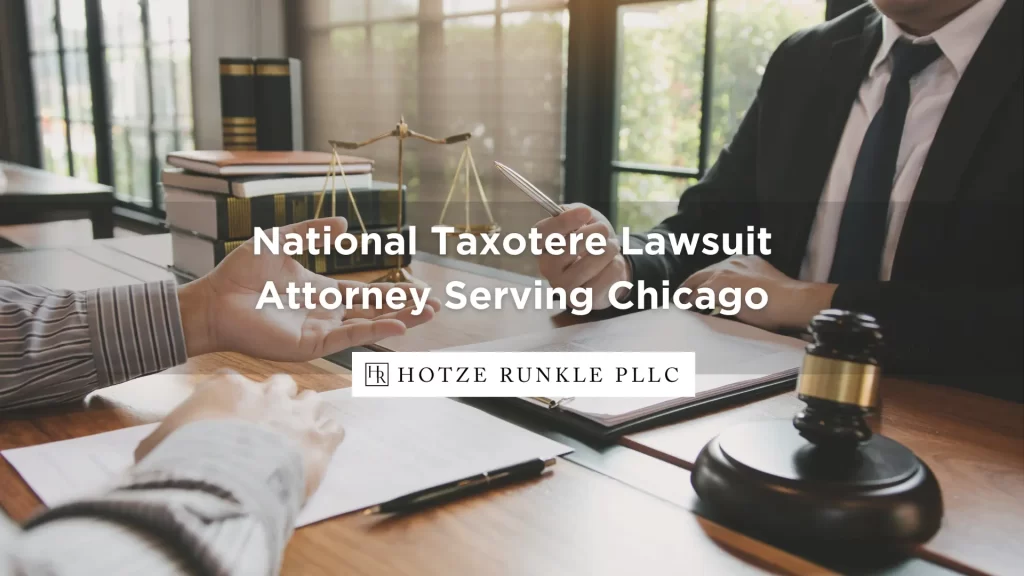
Drug manufacturer Sanofi-Aventis is facing lawsuits from individuals all over the country because of one of its drug’s dangerous side effects. Taxotere is a chemotherapy drug used mainly to treat breast cancer. Cancer patients who have taken Taxotere, however, have experienced debilitating symptoms, such as blurred vision, excessive eye-watering, and swollen eyelids. Those symptoms are associated with a serious eye condition called canalicular stenosis, and it may be permanent.
We know how frustrating it is to suffer adverse reactions from a drug that’s supposed to treat your cancer. Had you and your doctor known about these serious side-effects, you likely would have opted to take another chemotherapy drug, altogether. The evidence is clear that Taxotere can lead to canalicular stenosis, which, in turn, can impact a victim’s life on a daily basis.
Hotze Runkle PLLC may be able to help you pursue financial compensation for the symptoms you’re experiencing because of Taxotere. We have the experience and resources needed to take on a large pharmaceutical company like Sanofi-Aventis, and win. We will fight for justice and help you get back on your feet.
If you have developed watery eyes after taking Taxotere, take our Case Quiz to find out if you qualify for a Taxotere lawsuit today.
How Does Canalicular Stenosis Develop?
Some patients notice symptoms of excessive eye-watering while still undergoing Taxotere treatment, while, for some, symptoms appear following chemotherapy. When everything is functioning as normal, tears travel from the tear ducts into the nasal cavity through an ocular structure called the canaliculus. Debris that becomes trapped leads to chronic inflammation, eventually resulting in an infection. If the infection progresses, the canaliculus becomes blocked and prevents tears from funneling through correctly.
The first symptom people usually notice is excessive tearing. If you don’t see an ophthalmologist to manage the symptom, the canaliculi could close. When tears have nowhere else to go, they build up on the surface of the eye and run down the cheek upon blinking.
Canalicular stenosis is a permanent ocular condition. It’s possible to manage some of your symptoms; however, there’s no cure. The most common symptoms cancer patients and survivors experience include:
- Watery eyes
- Light sensitivity
- Eyelid swelling
- Blurry or cloudy vision
- Dry eyes
- Infections
- Headaches
- Cystoid macular edema
Symptoms range from mild to severe. Some people say it’s tolerable, while others complain that it completely interferes with their daily routine. In severe cases, those affected are unable to drive or perform their jobs. It’s an overwhelming and disruptive medical condition that diminishes their quality of life.
Why Does Taxotere Cause Eye Watering?
Sanofi-Aventis developed Taxotere to prevent cancer cells from spreading throughout the body. Depending on the type and stage of cancer, an oncologist administers the chemo drug on a schedule best suited for the patient. It’s been effective for common cancers, such as breast, lung, prostate, stomach, neck, and head.
While performing studies of the drug and how it interacts with a person’s body, medical researchers found a link between secretions from Taxotere and tears. While the drug travels throughout the body, it comes in direct contact with tears as they pass through the canaliculus into the nasal cavity. An adverse reaction results in chronic inflammation of the canaliculi, which leads to canalicular stenosis symptoms.
How to Treat Canalicular Stenosis Symptoms
As soon as you notice consistent eye-watering, it’s important to seek medical treatment right away. If caught early enough, your doctor can manage your symptoms and prevent them from worsening. Notify your oncologist that you’re experiencing side effects from your Taxotere treatment and schedule a consultation with an ophthalmologist.
Your ophthalmologist can closely monitor your health and manage your canalicular stenosis. If you want to continue your chemo treatment, you can, as long as you’re receiving proper care, to ensure your canaliculi don’t close entirely. Once they close, it’s impossible to reopen them.
Canalicular stenosis is irreversible, and there’s no known cure. You can try to alleviate your symptoms with the help of a procedure called DCR (dacryocystorhinostomy). The physician creates a new passageway for your tears to funnel through by drilling a hole in a bone in the ocular cavity. That allows tears to bypass the obstructed canaliculus and drain properly. Some people require the placement of a stent to help facilitate the flow of tears.
DCR is an expensive and invasive procedure. The eye area is sensitive and includes surrounding structures that could easily become damaged. It also comes with the risk of aggravating symptoms worse than the symptoms of canalicular stenosis. When you undergo DCR, the hazards you face include:
- Displaced stent
- Eye infections
- Partial or total blindness
- Permanent facial scars
- Hemorrhaging during and after surgery
- Abnormally fused tissue
- Sinusitis
- Unsuccessful surgery
If your condition progresses to the point that the obstruction in your canaliculus is so severe that it’s impossible to reconstruct a new tunnel for your tears, you might have to undergo CDCR. Conjunctivodacryocystorhinostomy requires the positioning of a glass tube called a Jones tube where the canaliculus was. It aids in the flow of tears into the nasal cavity. It’s as invasive as DCR, and it comes with the same risks.
Hold the Manufacturer of Taxotere Responsible for Your Diagnosis
Sanofi-Aventis marketed Taxotere for several years before releasing information about the adverse side effects. In 2014, they informed the FDA of possible symptoms associated with the chemo drug. Breast cancer survivors around the country alleged that the manufacturer was aware of the harmful side effects but failed to warn doctors and patients.
Deciding to file a lawsuit against a large pharmaceutical company is overwhelming. Big pharma is intimidating and has expensive lawyers at their disposal to fight against legal issues. If you choose to go up against them, you have an uphill battle ahead of you.
You have the right to hold Sanofi-Aventis responsible for their careless decision to withhold the side effects of Taxotere. Their total disregard for the well-being of cancer patients is unethical and deserves consequences. Despite knowing about the harmful reaction, they failed to disclose it to those undergoing chemotherapy.
If you took Taxotere and developed canalicular stenosis symptoms, you’re entitled to sue the drug company for compensation. Companies like Sanofi-Aventis shouldn’t be able to get away with knowingly distributing a dangerous product. Your diagnosis led to a great deal of suffering and upended your life. Hotze Runkle PLLC can help you pursue the financial award you deserve.
Hotze Runkle PLLC Legal Fees and Costs
Many victims of negligence will try to handle their lawsuit without the help of a lawyer. That could end up being a mistake. You might believe you’re saving money by representing yourself. However, not seeking legal representation could result in low compensation, or none at all.
When you don’t understand what your rights are, you could get taken advantage of by the opposing party. Pharmaceutical companies tend to enlist the help of an intimidating legal team that tries to persuade the injured party to accept less money than they deserve. If you don’t know the maximum financial award you’re entitled to, you could walk away with a fraction of the money you need to cover your expenses.
Hotze Runkle PLLC works on contingency, so you don’t have to worry about paying any upfront fees or costs. We don’t collect a fee unless we win your case. While your case is ongoing, you won’t have the added stress of paying us while you’re also paying your medical bills. If we’re able to secure a settlement or favorable jury verdict, we’ll take a percentage out to cover our legal fees. If we don’t win your case, you won’t owe us anything.
How Much Money Could I Win from a Lawsuit?
 In a lawsuit, there are two types of damages you could receive compensation for: economic and non-economic. Economic damages are expenses, while non-economic damages are intangible losses. You could potentially recover the following damages in a lawsuit against Sanofi:
In a lawsuit, there are two types of damages you could receive compensation for: economic and non-economic. Economic damages are expenses, while non-economic damages are intangible losses. You could potentially recover the following damages in a lawsuit against Sanofi:
- Medical bills
- Lost wages and loss of future earnings
- Physical pain and suffering
- Emotional or psychological trauma
- Loss of consortium
To convince the jury you deserve compensation, you need to establish that at least one of the following factors existed:
- Manufacturing Defect: When a product leaves the manufacturer in a condition that isn’t intended.
- Defective Design: A product fails to perform as safely as a reasonable person would expect.
- Failure to Warn: When a manufacturer doesn’t warn its users of potential dangers of the product.
You also have to file a suit based on negligence or liability on the part of Sanofi-Aventis.
Negligence
- Sanofi owed you, the user, a duty of care;
- The manufacturer breached that duty; and
- The breach caused your symptoms of Canalicular Stenosis.
Liability
- The drug company sold Taxotere in a dangerous condition;
- That condition existed when it left Sanofi’s direct control; and
- That condition led to your symptoms.
The compensation you win depends on various factors that the jury will review. Adding up your total costs related to canalicular stenosis and necessary treatment is easy because there are bills associated with everything.
When it comes to your non-economic damages, such as emotional trauma, it’s a bit more difficult to calculate. A jury will usually take into account the following information when they’re trying to come up with the appropriate number:
- The nature of the injury
- Past and future physical and mental pain and suffering
- If the injury caused disfigurement
- Permanent impairment preventing performing usual activities and tasks
- Aggravation to preexisting medical conditions
Our attorneys will work closely with you to determine the types of compensation you may be entitled to, based on the factors of your case.
Find Out How Hotze Runkle PLLC Can Help You
At Hotze Runkle PLLC, our Chicago Taxotere lawyers believe in making the legal process as easy and stress-free as possible. That’s why we offer a free consultation to our prospective clients. We’ll review your symptoms and medical records to determine if we can move forward with your case. If you’re looking for legal advice, we’ll be happy to let you know what your best options are for securing a financial award.
To determine if you can file a lawsuit against Sanofi-Aventis for your diagnosis of canalicular stenosis, take our Taxotere Quiz today.